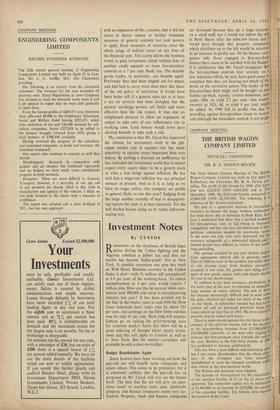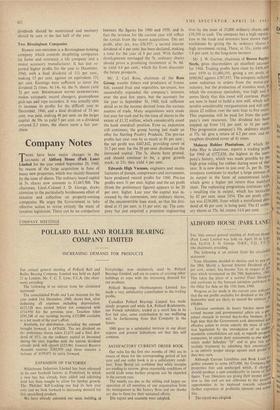Investment Notes
By CUSTOS
EMARKING on the steadiness of British share prices during the Cuban fighting and the Algerian rebellion a jobber has said that our market has become 'bullet-proof.' Not so New York. A sizeable correction was seen this week on Wall Street. Business recovery in the United States is slow—with 51 million still unemployed, or 6.9 per cent. of the working force. To reduce unemployment to 4 per cent. would require 7 million jobs. How can this be secured when auto- mation took 900,000 jobs away in manufacturing industry last year? It has been pointed out to me that in the twelve years to end-1960 the Dow Jones industrial share index rose by about 233 per cent., but earnings on the Dow Jones equities rose by only 45 per cent. How long will popular fashion go on raising the price-earnings ratio for common stocks? Some day there will be a great sobering of thought about equity invest- ment and this will apply to London as well as tc• New York. But the market correction will probably be only a short-term affair.
Budget Beneficiaries Again
Some brokers have been working out how the pay-roll tax will benefit some companies and injure others. This seems to be premature, for it is extremely unlikely that the pay-roll tax, as proposed by Mr. Lloyd, will ever see the statute book. The idea that the tax will give 'an enor- mous boost' to machine tools, steel, chemicals, property and finance companies seems very far- fetched. Property, bank and finance companies are favoured because they do a huge turnoN et on a small staff, but I would not follow the rise in Bank shares after the MIDLAND bonus and I would have thought that property companies which distribute up to the hilt would be sensitive to an increase in profits tax. Of the finance co panies only those engaged in hire-purchase finance have cause to be satisfied with the Budget. It is satisfactory that Mr. Lloyd recognised that the hire-putchase controls bore severely on a few industries which, he said, have good cause to complain that they are bearing too much of the brunt of the corrective action. The leader of the hire-purchase field might well be bought on any further set-back, namely UNITED DOMINION, Holy under 200s. to yield 2.7 per cent.—but WAGON FINANCE at 102s. 6d. to yield 4 per cent. might be added. Its 1960 fall in profits was due to providing against hire-purchase losses in motors and although the immediate outlook is not bright
dividends should be maintained and recovery should be seen in the last half of the year.
Two Birmingham Companies
HARRIS AND SHELDON iS a Birmingham holding company which controls shopfitting companies (at home and overseas), a lift company and a motor accessory manufacturer. It has just re- ported higher profits for the year to December, 1960, with a final dividend of 111 per cent., making 15 per cent. against an equivalent 131 per cent. Earnings were sufficient to over the dividend 21. times. At 14s. 6d. the 5s. shares yield 5+ per cent. BIRMINGHAM SOUND REPRODUCERS makes automatic record changers, gramophone pick-ups and tape recorders. It was actually'able to increase its profits for the difficult year to December, 1960, and a final dividend of 35 per cent. was paid, making 40 per cent. on the larger capital. At 39s. to yield 5 per cent. on a dividend covered 2.3 times, the shares seem a fair pur- chase.















































 Previous page
Previous page